|
|
|
Sort Order |
|
|
|
Items / Page
|
|
|
|
|
|
|
| Srl | Item |
| 1 |
ID:
190738
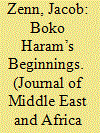

|
|
|
|
|
| Summary/Abstract |
This article centers on the Guantánamo detainee assessment of diaspora Nigerian jihadist in Saudi Arabia, Umran Bakr Muhammad Hausawi (Umran), which has never been cited previously in literature on Boko Haram. Through analyzing this detainee assessment alongside Boko Haram founding members’ interviews, al-Qaeda publications about Boko Haram’s founders, media reports contemporaneous with Boko Haram’s founding, US leaked and declassified intelligence documents about Nigeria during Boko Haram’s founding period, and Nigerian salafis’ firsthand accounts of Boko Haram’s founders, this study argues that diaspora Nigerians in Saudi Arabia introduced jihadism to Nigeria along with an Algerian jihadist operating in Nigeria in 1994. Moreover, Umran’s detainee assessment and corroborative sources demonstrate Saudi, US, and Nigerian intelligence officials monitored jihadists from Nigeria’s diaspora in Saudi Arabia before Boko Haram’s founding in 2002 and first confrontations with Nigerian security forces in 2003. This work also affirms that Boko Haram’s “originator,” Muhammed Ali, was a diaspora Nigerian jihadist in Saudi Arabia and received funding through Umran, Umran’s brother Umar, and Usama bin Laden’s Yemeni envoy, who all operated between Nigeria and Afghanistan before 9/11 on Bin Laden’s directives. Further, the jihadist from Nigeria’s diaspora in Saudi Arabia who succeeded the Yemeni envoy, Ibrahim Harun, knew Umran, Umar, and their other brother who joined al-Qaeda with Umar around 1995. This was eight years before Harun traveled from Pakistan to Nigeria on an al-Qaeda mission. This research supports the emerging literature that argues that studies of Boko Haram’s evolution from 2004 under Ali’s successor, Boko Haram “founder” Muhammed Yusuf, must consider the intense intelligence pressure that jihadists experienced in Nigeria after 1995, which Yusuf sought to avoid, and which affected Yusuf’s preaching and preparation for the jihad he eventually launched in 2009. The article further contributes to the literature on transnational, salafi-jihadist currents throughout the Muslim world and the Nigerian diaspora.
|
|
|
|
|
|
|
|
|
|
|
|
|
|
|
|
| 2 |
ID:
178936


|
|
|
|
|
| Summary/Abstract |
This article examines the factions, leadership, and internal organization of Boko Haram, the terrorist group which has operated to devastating effect in parts of northern Nigeria, Niger, Chad, and Cameroon. It finds the group’s leadership has been significantly more centralized than previous literature has acknowledged. The leadership was also extremely ruthless but enforced group cohesion by killing anyone who sought to defect. Group members attempted to defect and depose the leadership in 2012 and 2016 by seeking external interventions from Al Qaeda in the Islamic Maghreb (AQIM) and the Islamic State of Iraq and the Levant (ISIL), respectively. In the first instance Boko Haram’s leadership demonstrated control and influence by forcing defectors back into submission, but in the second instance ISIL-backed militants deposed the leadership in a rebellion and coup. The loyalty to ISIL of jihadist commanders and foot soldiers in Nigeria explains why only the rebellion and coup succeeded in 2016 even though AQIM provided greater material support to the first set of defectors in 2012. This article contributes to research on internal dynamics of Boko Haram, the relationships between Al Qaeda and ISIL and their allied and affiliated organizations, and the costs and benefits of extreme leadership for terrorist groups.
|
|
|
|
|
|
|
|
|
|
|
|
|
|
|
|
| 3 |
ID:
172495
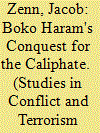

|
|
|
|
|
| Summary/Abstract |
This article explains how Al Qaeda in the Islamic Maghreb (AQIM)–trained Nigerian militants split from Boko Haram and formed a new group called Ansaru in 2011 after consulting with AQIM. Ansaru leaders, however, reintegrated with Boko Haram and transferred their specialized skills in kidnappings, suicide bombings, and media to Boko Haram and contributed to the group's conquest of territory in 2013. Al Qaeda did not benefit from these conquests because Ansaru leaders switched loyalties and helped arrange Boko Haram's pledge to Islamic State in 2015. This article exploits primary source documents from AQIM, Islamic State, and Boko Haram and contributes to the literature on splits and mergers and knowledge transfer between terrorist groups and Al Qaeda–Islamic State competition.
|
|
|
|
|
|
|
|
|
|
|
|
|
|
|
|
| 4 |
ID:
173390
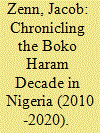

|
|
|
|
|
| Summary/Abstract |
Boko Haram videos are among the only windows into the group leadership’s ideology. However, previous studies of Boko Haram videos treated the group monolithically and neither distinguished between internal factions nor analyzed cinematographic settings in each faction’s videos. At a time when the two groups known as Boko Haram–Islamic State in West Africa Province (ISWAP) and Jamaat Ahlussunnah lid-Dawa wal-Jihad (JAS)–rival each other and combat Nigerian and subregional military forces, this article argues it is imperative to examine factions’ contrasting self-presentations in videos. While one faction led by Abu Musab al-Barnawi revealed combat skill and lectured about an Islamic state, another faction led by Abubakar Shekau revealed veneration of Shekau, masses of worshippers in group territories, and imposing sharia punishments. Even when these factions were nominally unified, they still produced media separately and competed to control communications to Islamic State. Another Boko Haram breakaway group called Ansaru also influenced Boko Haram videos after some members reintegrated into Abu Musab al-Barnawi’s faction. This article demonstrates how in jihadist groups the one wielding the camera also wields power and how jihadist videos can facilitate understanding a group’s internal dynamics.
|
|
|
|
|
|
|
|
|
|
|
|
|
|
|
|
| 5 |
ID:
122266
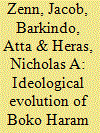

|
|
|
|
|
| Publication |
2013.
|
| Summary/Abstract |
Ideological factors help to define the evolution of terrorist organisations, influenced by the domestic and global political context. Jacob Zenn, Atta Barkindo and Nicholas A Heras examine the ideological motivations that influenced the transformation of Boko Haram from local salafism to international jihadism. They seek to analyse the extent to which, in addition to local grievances and its own internal politics, the ideology of other transnational extremist organisations and Nigerian history and politics have influenced the ideological development of Boko Haram.
|
|
|
|
|
|
|
|
|
|
|
|
|
|
|
|
| 6 |
ID:
129306
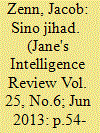

|
|
|
|
|
|
|
|